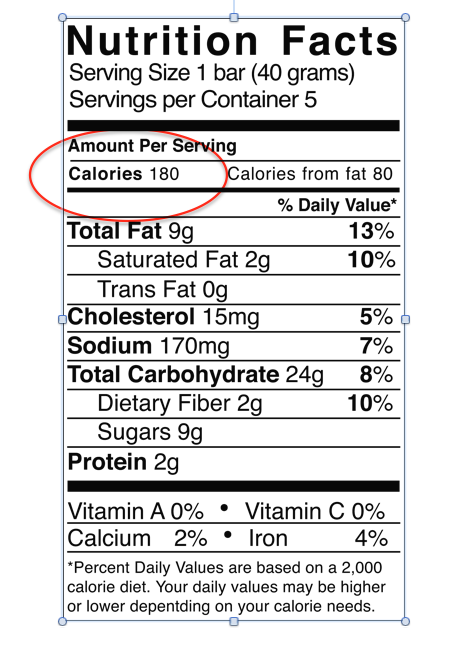
Calories: a unit used to measure the amount of energy food provides when eaten and digested.
Counting calories is one of the most popular methods people use for weight loss. Seeking to shed unwanted pounds, dieters carefully select their food choices based on the total number of calories allocated for their gender, age, height, weight, and average daily level of activity. It’s a simple mathematical solution to lose weight; don’t eat more than your prescribed calorie allotment. But what seems like a logical solution is actually unhealthy and counter productive.
Here’s why:
1. Calories have nothing to do with nutrition.
Caught up in the number game, it’s not surprising how easy it is to lose sight on the importance of the nutrient power of the foods we eat. Calorie counting dieters reach for prepackaged weight loss meals and treats that proclaim they will help them lose weight since they are lower in calories then their forbidden counterparts.
However, a majority of weight loss foods are nutrient poor, not to mention filled with chemical additives and substitutions that are toxic to your body. These products might help you feel less deprived of the foods you love, but their empty calories and toxic load actually damage your body.
What also tends to happen is what I like to call the “food trading game”. It goes like this, “Well, since I was good and ate a low calorie salad for lunch, I can have two handfuls of M&Ms for snack.”
By focusing on the calories, you completely ignore the most important aspect of food, the nutrients your body needs. Those nutrients are the fuel that maintain your wellbeing, from the healthy glow of your skin to the cells that make up your internal organs and the biological systems that keep your body functioning at an optimal level.
2. Counting calories leads to the common misconception that all types of fat promote weight gain and the fewer the calories you consume the healthier the food.
Fat is an important part of our diet. Our heart, brain, muscles, and skin all need fat to function properly. Our diet should not be about eliminating fat, but about consuming the fat that is best for our bodies. Take an avocado for example. One cup of sliced avocado can have over 200 calories. Yikes! But before you dismiss this high calorie food, it is important to note that more than two-thirds of those calories come from monounsaturated oleic acid. Your body uses monounsaturated fats as a slow burning energy source which studies have shown help improve insulin sensitivity and glycemic control, important tools in maintaining a healthy weight. In addition, consuming healthy fats with your meal improves nutrient absorption and increases satiety so you don’t feel hungry as often.
3. The amount of calories indicated on food labels are not exact.
Food manufacturers base their calorie counts on a system of averages, not on how many calories are actually in that packaged food or how much energy your unique digestive system will use to process and absorb the ingredients.
Digestion varies widely depending on:
- The quality of the food used (ripeness, picked in season versus stored, variety)
- How the food is processed (chemically, heated, frozen)
- How you prepare the food when eaten (cooked, raw)
- The current state of your gut bacteria
- How much energy your unique body uses to digest food
The above criteria makes it virtually impossible to define the exact calorie of any given food.
Additionally, food manufactures are allowed a significant margin of error when indicating what the average calorie of a product is. “[T]he ratio between the amount obtained by laboratory analysis and the amount declared on the product label in the Nutrition Facts panel must be 120% or less, i.e., the label is considered to be out of compliance if the nutrient content of a composite of the product is greater than 20% above the value declared on the label.” (FDA Guidance for Industry: Nutrition Labeling Manual).
How can we trust what we are truly eating?
4. Less calories does not necessarily equate to weight loss.
Eat less calories = lose weight? Well, it’s not that simple. What actually happens is your body compensates. As you reduce your calorie intake, your body reduces the calories it expends. The results: the dieter tends to get more tired, hungry and crave high calorie foods.
Research has proven that, not only do you feel healthier on a plant-based diet, but you will easily acquire and maintain your optimum weight. It’s very difficult to overeat when focusing your diet on plant-based foods.
Next Steps Towards A Healthier You:
- Develop healthy eating habits by reaching for whole plant-based foods that are nutrient dense. Forget about the calories – it’s all about food choices. Read our blog article, Learn how to develop healthy eating habits.
- Include only healthy fats in your diet: avocados, coconut oil, olive oil, hemp oil, and nuts/seeds.
- Limit prepackaged processed foods that contain unidentifiable ingredients. Learn to read your food labels.
- Combine healthy eating with exercise and you’re off to a great start. Take daily walks, ride a bike, dance, swim, try zumba… the options are unlimited. The idea is to move your body and get your blood flowing.
- Check out our delicious, healthy recipes.
- Read our blog posts. They are filled with up-to-date information on food and nutrition.
- Take it one meal at a time.
